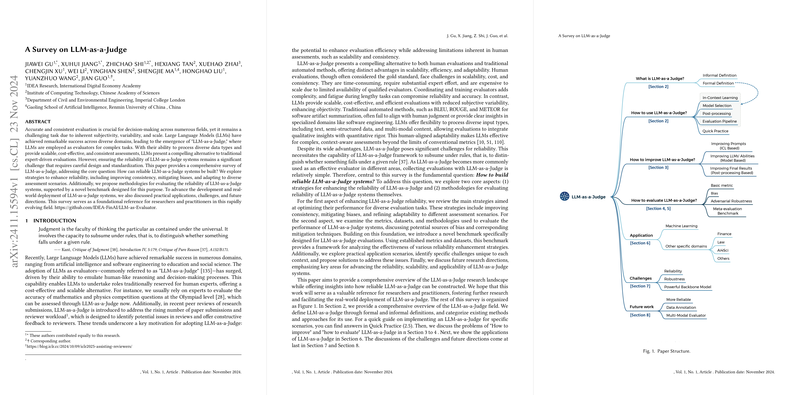Survey on LLM-as-a-Judge: An Examination of Current Approaches and Future Directions
This paper presents a comprehensive survey of the concept of "LLM-as-a-Judge," exploring the potential of LLMs to serve as evaluators across various domains. With the expanding capabilities of LLMs, their role as a scalable, cost-effective, and consistent alternative to conventional expert-driven evaluations is increasingly considered. However, the reliability of LLM-as-a-Judge systems remains a complex issue requiring systematic investigation and enhancement.
The survey meticulously reviews strategies aimed at enhancing the reliability of LLM evaluators. These strategies include improving consistency in assessments, addressing biases, and refining adaptability to different evaluation scenarios. The paper also introduces innovative methods for evaluating the reliability of these systems, supported by a novel benchmark tailored for this purpose. Several relevant metrics are identified to assess key performance dimensions, such as agreement with human evaluations, robustness, and the presence of biases. It is crucial to evaluate LLM-as-a-Judge systems accurately to ensure that they align with human judgment across different assignments.
Key Insights and Implications
- Enhancement Strategies:
- Prompt Design: Enhancements to prompt design, including few-shot prompting and the decomposition of evaluation steps and criteria, reveal significant gains in alignment with human judgment. By optimizing the understanding of evaluation tasks, LLMs demonstrate improved performance across diverse tasks.
- Model Fine-tuning: Using meta-evaluation datasets to fine-tune models enhances their capacity to generate evaluation outputs aligned with human preferences. This approach addresses specific biases and improves overall reliability.
- Post-processing Techniques: Techniques such as self-validation and multi-round summarization are shown to mitigate biases further and enhance the consistency of evaluation results.
- Challenges and Biases:
- The survey identifies notable biases inherent in using LLMs as evaluators, including positional, length, and self-enhancement biases. The presence of these biases underscores the need for customized strategies for bias detection and mitigation in LLM evaluations.
- Evaluating the robustness of LLMs against adversarial examples is essential. Current methods reveal vulnerabilities, emphasizing the importance of robust defense mechanisms to prevent manipulation.
- Benchmark Development:
- The establishment of rigorous benchmarks specific to LLM-as-a-Judge, such as LLMEval and EVALBIASBENCH, is crucial for systematically assessing LLM performance against human evaluation standards. These benchmarks provide valuable insights into LLM capabilities and limitations in realizing reliable judgment.
Theoretical and Practical Applications
The paper underscores the applicability of LLMs in fields such as finance, law, scientific research, and education, where they serve as reliable evaluators in various assessment tasks. However, refining LLM-as-a-Judge systems to handle domain-specific complexities effectively remains a challenge that requires continued exploration and innovation.
The implications for further research are extensive. Future work should focus on enhancing the reliability of LLM evaluators, developing more robust multi-modal evaluators, and expanding the scope of benchmarks to include diverse real-world evaluation scenarios. Addressing these challenges will ensure that LLM-as-a-Judge systems are more accurate, scalable, and reliable, ultimately facilitating their broader adoption across industries.
Conclusion
The survey presents an exhaustive overview of the LLM-as-a-Judge field, highlighting the current strategies, challenges, and future directions in developing reliable LLM-based evaluators. It serves as a foundational reference for researchers and practitioners, setting the stage for future advancements and real-world implementations of LLM-as-a-Judge systems. Through targeted improvements and systematic evaluations, LLMs can achieve their potential as highly effective evaluators capable of transforming the landscape of automated assessments.
